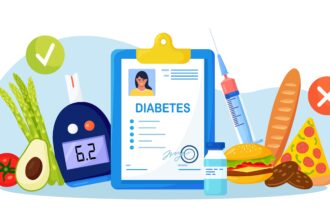Cardiovascular diseases (CVD) are a group of diseases related to the work of the heart muscle and blood vessels that supply blood to the heart, brain, legs, and arms. In fact, heart disease is the leading cause of death in the United States.
When it comes to cardiovascular health, the most common behavioral risk factors are tobacco use, unhealthy diet, lack of physical activity and harmful alcohol consumption. Simply put, behavioral risk factors are everyday life habits that have a major impact on your overall health. So, if you’re smoking, chances are high that someone may have warned you that you are at risk for CVDs.
If you change a habit, it could have a transforming effect on your health and well-being. Nevertheless, despite being more aware of the important risk factors, you have to get regular check-ups by a heart and vascular care specialist. These check-ups are essential, whether or not you have been diagnosed with cardiovascular disease.
Below are some important tips on how to maintain your cardiovascular health. Our tips address the four most important behavioral risk factors for cardiovascular disease and they all relate to everyday habits. So, if you or a loved one has already been diagnosed with cardiovascular disease, now you can learn how to control the disease or prevent it from developing.
1. Quit Smoking
Did you know how many people die every year of smoking tobacco? The Lancet reports that tobacco kills almost half of those who use it. It causes 7 million deaths every year. The data is frightening, but it’s true.
So, how can you protect yourself and others from the harmful effects of tobacco? You have to say no to tobacco and stop smoking. It’s because you are putting your heart at risk and also endangering the health of others. Passive smoking also causes serious diseases.
Tobacco damages almost all organs of the human body, but it is the number one risk factor for developing coronary heart disease, stroke, and peripheral vascular disease. Among at least 250 other harmful chemicals, smoking tobacco releases carbon monoxide, which prevents the heart and brain from being supplied with oxygen by the blood. Other substances and chemicals also contribute to heart disease and stroke.
Therefore, you are one decision away from helping yourself and others protect their health and well-being. If you stop smoking, you can protect your heart and benefit from immediate and long-term health benefits. Stopping smoking after a heart attack reduces the risk of another heart attack by 50%. Although tobacco is addictive, once you manage to stop smoking, you will be encouraged to change other daily habits as well.
2. Limit Your Alcohol Consumption
Consumption of alcohol, followed by regular, heavy, episodic alcohol consumption, increases the risk of CVD by damage to the heart muscle. It also increases the risk of stroke and can lead to cardiac arrhythmia.
If you want to reduce your risk of developing cardiovascular disease, reconsider and change your alcohol consumption habits. One or two glasses are considered a moderate dose. The World Health Organization recommends avoiding drinking every day or at least two days a week. Remember that it is always better to drink less alcohol.
3. Follow a Healthy Diet
An unhealthy diet can also be a risk factor for CVDs. If your daily consumption of fruit and vegetables is low and your intake of salt, fat, and sugar is high, this means that you are eating unhealthy food. An unhealthy diet also leads to being overweight and obese, which are also risk factors for cardiovascular disease.
On the other hand, a healthy diet can help prevent heart attacks and strokes. It does not have the same definition for everyone. It depends on individual needs, but above all on locally available food. Nevertheless, there are some essential components of a healthy diet.
First of all, eat as many fruits and vegetables, legumes, nuts, and whole grains. Fruits and vegetables provide fiber, vitamins, and minerals. The second basic element is to make sure that you consume less than 5 g or a teaspoon of salt per day. This includes the salt you add when preparing your meal.
And finally, the total daily energy intake of fats must be limited to less than 30%. Unsaturated fats are preferred and are generally found in plant foods such as seeds, nuts, vegetables, and fruits (e.g. avocado). Unsaturated fats control cholesterol levels and in particular reduce the risk of heart attack and stroke.
4. Be Physically Active
Insufficient physical health is another risk factor for CVD related to our daily lifestyle. Even a short walk can improve our mood and prevent the development of CVDs. Sometimes we get overwhelmed with our to-do lists, we forget to move away from our computer and telephone screens and how important it is to be active.
There are many ways to be physically active: walking, exercise, cycling, dancing. Besides leisure activities, physical activity can be as easy as doing chores. However, it is best to plan a certain physical activity on a daily or weekly basis. This way you can improve and maintain your health and well-being and reduce the risk of heart attack and stroke.
You can start with a minimum of 15 minutes a day and gradually increase the time and intensity from moderate to vigorous, depending on your abilities. Moderate physical activity, such as doing chores, will result in a slight increase in heart or breathing rate. Strong physical activities include fast swimming, cycling or doing sports. Physical activity is also recommended for people that already have cardiovascular disease.
Whether you have been diagnosed with CVD or you are careful and want to prevent the development of CVD, it is always good to think about your daily habits and try to improve your health.
A healthy diet, a daily dose of physical activity or the decision to stop smoking can only benefit you. Again, if you start to change a daily habit, you might be surprised by the ripple effect. Start today!










